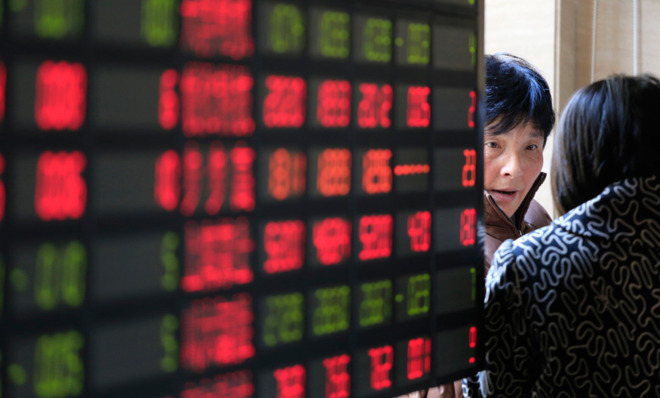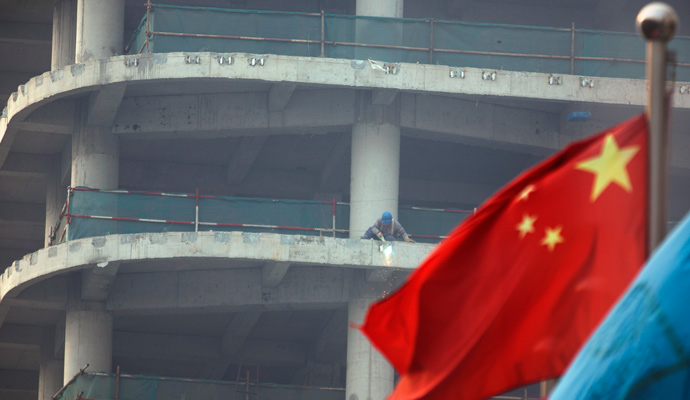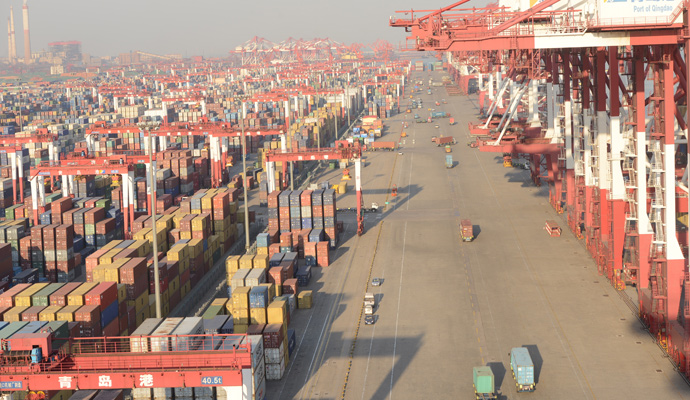Is China's economy headed for a crash?
George Soros sees China as the biggest risk to global growth going into 2014

A free daily email with the biggest news stories of the day – and the best features from TheWeek.com
You are now subscribed
Your newsletter sign-up was successful
In his assessment of the global economy's performance 2013, legendary financier George Soros warned of dangers in the Chinese economy:
The major uncertainty facing the world today is not the euro but the future direction of China. The growth model responsible for its rapid rise has run out of steam.
That model depended on financial repression of the household sector, in order to drive the growth of exports and investments. As a result, the household sector has now shrunk to 35 percent of GDP, and its forced savings are no longer sufficient to finance the current growth model. This has led to an exponential rise in the use of various forms of debt financing.
There are some eerie resemblances with the financial conditions that prevailed in the U.S. in the years preceding the crash of 2008. [Project Syndicate]
That, as William Pesek notes, is a rather ominous conclusion. So is China due a crash?
It’s very hard to say because China’s financial and political systems are so different from those in the West. Although many Western businesses operate in China — taking advantage of its huge, cheap labor pool for manufacturing — China is not a capitalist country.
The Week
Escape your echo chamber. Get the facts behind the news, plus analysis from multiple perspectives.

Sign up for The Week's Free Newsletters
From our morning news briefing to a weekly Good News Newsletter, get the best of The Week delivered directly to your inbox.
From our morning news briefing to a weekly Good News Newsletter, get the best of The Week delivered directly to your inbox.
Its economy is centrally planned by its government. The state owns the banks and the bulk of Chinese businesses. China’s ruling Communist Party creates five-year plans that act as a template for the direction of these state-owned banks and businesses.
If the state’s five-year plan calls for more roads, more healthcare spending, and more skyscrapers, then the state's banks, enterprises, and bureaucracies coordinate to achieve those aims. In other words, creating a profit for independent shareholders is not the state's main concern; carrying out the policy of the state is. While Western countries have some companies like this (think Fannie Mae and Freddie Mac in the U.S.), China's economy is dominated by them.
This has allowed the government to invest enormously in infrastructure, development, and industrial capacity, putting China at the heart of a web of global trade. Real growth rates have averaged above 10 percent for the past 30 years. China has become exporter to the world, building up a huge hoard of foreign currency — $3.3 trillion in cash, and over $1 trillion in U.S. treasury bonds.
According to Soros and Peking University professor Michael Pettis, this has resulted in the buildup of imbalances and latent risks. Tilting the economy to favor investment — especially over a long period of time — may grow investment, infrastructure, factories, exports, etc. But it hasn’t grown household consumption — ordinary people buying goods like washing machines, iPads, and cars, or services like restaurant food and vacations — at anywhere near the same rate. China has built so much infrastructure that it now has ghost cities — huge sprawls of roads, buildings, bridges, schools, and hospitals that sit empty and unused.
A free daily email with the biggest news stories of the day – and the best features from TheWeek.com

Furthermore, in recent years this investment-driven growth has become increasingly reliant upon debt. As Soros noted, "There is an unresolved self-contradiction in China’s current policies: Restarting the furnaces also re-ignites exponential debt growth, which cannot be sustained for much longer than a couple of years."
Nobody actually knows quite how much debt China’s notoriously opaque financial system is sitting on. The funding for many of the state-owned enterprises comes through local government, rather than directly from the central government. Local government debt has soared over 20 percent in each of the last three years, far outpacing growth.
Sooner or later China must rebalance its economy, shifting away from investment- and export-driven growth toward consumption-driven growth, which would entail the emergence of a large-scale higher-spending Chinese middle class. China is not only facing internal pressures: Its economy has grown on the back of large trade surpluses, but every trade surplus for one country is by definition a trade deficit for other countries. Lots of people in the United States, for one, aren't happy seeing so much American money and resources migrate abroad to create jobs and prosperity in Shanghai, Guangzhou, and Chongqing. Sooner or later, countries tend to move to reduce their trade deficits through currency devaluation or trade barriers.
Exactly how China's rebalancing will come is harder to say. One way is through a slow, painful process following a financial crash. As Pettis argues, "Every country that has followed a consumption-repressing investment-driven growth model like China’s has ended with an unsustainable debt burden caused by wasted debt-financed investment. This has always led either to a debt crisis or to a lost decade of very low growth.
A Chinese crash is certainly a possibility, given the apparent perils lurking in the Chinese financial system. It is easy to imagine China's real estate market cratering, a series of debt defaults crippling banks and local governments, and a severe credit crunch that would strain the resources of China's central bank. While the government would surely come to the rescue, it won't be able to contain the fall in investor confidence nor a stock market crash."
And as Japan’s two lost decades shows, once the crisis hits, expectations can become very depressed for a very long time.
Such a slowdown would be a disaster for a country like China, which needs at least seven percent growth to create a sufficient number jobs for its huge and growing population.

On the other hand, China is uniquely positioned to address these challenges. There are no opposition lawmakers to block economic reforms, which enabled China to respond far more rapidly and robustly to the 2008 crash than the United States and its democratic peers. China’s pre-existing industrial and infrastructural strength is also an advantage, while its huge foreign currency hoard gives it the ability to buy up other countries’ industries and natural resources.
The Communist Party can recalibrate the economy in a gradual and gentle manner, but it will require a lot of proactive measures, including shoring up the balance sheets of state-owned enterprises and local governments; allowing private banks and businesses greater freedom in allocating capital; investing in education; raising wages so that a new middle class can develop; bringing more transparency to a shadowy legal system that discourages foreign investment; and rooting out government corruption.
Most controversially, it will involve letting go of the economy's top-down model and introducing democratic reforms. President Xi Jinping has indicated that his administration will make a priority of liberalizing the economy. But he has also moved to centralize power, a discouraging sign for reform advocates.
That is a big list of asks. But for China, it may be the only way to avoid an economic catastrophe. And it may be too late already.
John Aziz is the economics and business correspondent at TheWeek.com. He is also an associate editor at Pieria.co.uk. Previously his work has appeared on Business Insider, Zero Hedge, and Noahpinion.
-
 Trump wants a weaker dollar but economists aren’t so sure
Trump wants a weaker dollar but economists aren’t so sureTalking Points A weaker dollar can make imports more expensive but also boost gold
-
 Political cartoons for February 3
Political cartoons for February 3Cartoons Tuesday’s political cartoons include empty seats, the worst of the worst of bunnies, and more
-
 Trump’s Kennedy Center closure plan draws ire
Trump’s Kennedy Center closure plan draws ireSpeed Read Trump said he will close the center for two years for ‘renovations’